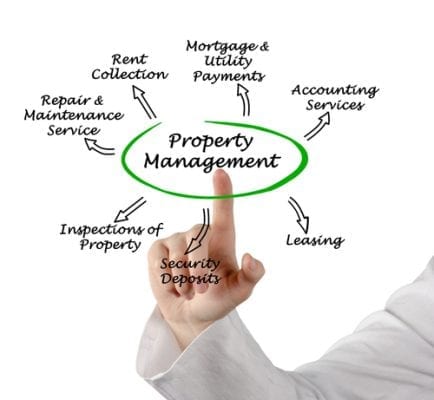A Property Manager is different than a landlord. Typically, a landlord makes money from rent and is the property owner. Some landlords do manage their properties as well, but that takes education and experience. In simple terms, a property manager protects your rental investment and provides services to ensure a steady rental income, keep residents happy, and manage a well-maintained property. However, property managers can do a lot more than that!
Responsibilities of a Property Manager

A Property Manager runs daily operations and financials of a property (or multiple properties). Coordinating maintenance work, overseeing marketing for a property, and meeting lease and code requirements are some of the daily tasks in the life of a PM. The goal of a property manager is to increase property revenue, fill vacancies quickly, retain good tenants, and satisfy the needs of residents.
A typical property manager has at least a high school degree and a degree in business administration, real estate, or another closely related field. They should have plenty of leasing experience, excellent customer service skills, working knowledge of property management laws and operations, and an understanding of finances and marketing. This person must be well versed in property management terminology and have high proficiency with software like Microsoft Suite, as well as property marketing platforms.
Primary tasks of a Property Manager
- Marketing: An experienced property manager knows how and when to market your property to avoid vacancy. They know how to write effective rental property ads and which sites to post on to bring the most qualified leads.
- Tenant Screening: Tenant screening is a huge part of a property manager’s job. Most property management companies already have a sound screening service that they use to determine if prospects are qualified to lease at the properties they manage. The screening service will run a background check, credit check, income verification, and criminal background. If a tenant is below the income requirements, has poor credit or a criminal history including domestic violence or a felony, they will not be permitted to live on your property. Effective screening assures landlords that their tenants are qualified and unlikely to be problem tenants or necessitate an eviction.
- Lease Contracts: The Property Manager always signs the lease with the tenant. An employee in this position will have experience with lease laws and the necessary language to protect the property management company as well as the landlord. A well-written lease will help ensure that the tenant is legally obligated to pay rent, will not be involved in criminal activity on the property, and abide by other policies. It will also state what will occur in case of a lease-break or non-payment. Property managers must have lease drafting experience to ensure your lease is legally binding and following federal, state and local laws.
- Rent Collection: Property Managers also handle rent collection. They either accept checks in-person or by mail and deposit them (a less common method), or set up and track online payments and charge fees as applicable. Some fees may include pet fees, late fees, or lost item fees (i.e., keys).
- Financials: An essential qualification a Property Manager should possess is some financial or accounting background. Not only will they oversee rent payments and fees, but also maintenance costs, renewal increases, and budgets (i.e., marketing, lease incentives, upgrades to properties, cleanings, etc.).
- Property Maintenance: Although a Property Manager is not usually responsible for managing maintenance staff, they do sometimes hire the maintenance manager and work closely with them. They’re still accountable for finding maintenance vendors and hiring the property staff to take care of maintenance requests and issues within a reasonable time frame.
- Delinquency & Eviction: For many Property Managers, this is the worst part of the job, but necessary. They handle delinquencies, meaning late payments or non-payments. There is a standard procedure for them to handle these issues, which includes providing a grace period, reaching out to request payment, and beginning the eviction process if need be. Also, a Property Manager has to be well versed in Baltimore County eviction laws and procedures.
These are just a few of the many tasks of a Property Manager. Property Managers are there to maintain a well-run and financially stable property. Every property, big or small, should have a trained property manager or property management company to keep everything running smoothly.
Who Should Hire a Property Management Company?
We recommend any new landlords or landlords with little property management and leasing experience to hire a property management company. Having a property management company on board is the best way to keep property financials straight, be sure the property is marketed well and shown by professional leasing staff, and manage all property maintenance. Additionally, they will supervise and direct all the necessary staff to keep your property running smoothly.
Additional reasons to hire a property management company:
- Multiple properties
- Vacancy
- Problem tenants
- Lack of management or supervisory experience
- Inexperienced with leases and contract law
- Lack of understanding of property compliance
- Living in a different area than your rental property
- You could use the help!
Baltimore County Property Managers
Bay Property Management Group Baltimore County is an excellent option for expert property management. We have plenty of professionally trained leasing, property management, marketing, and maintenance staff to run your properties seamlessly. Whether you have multiple properties, are new to the industry, or just need some additional assistance, Bay Property Management Group can help. Contact us today to discuss pricing and services and receive a free rental analysis.
